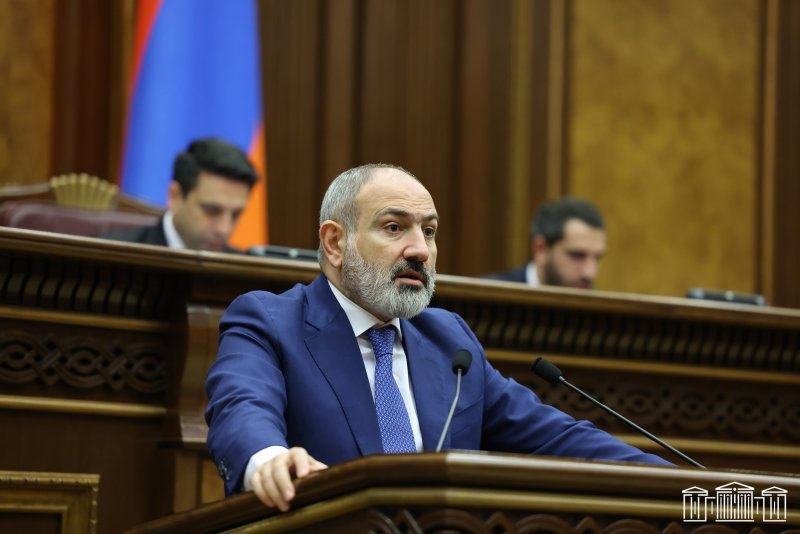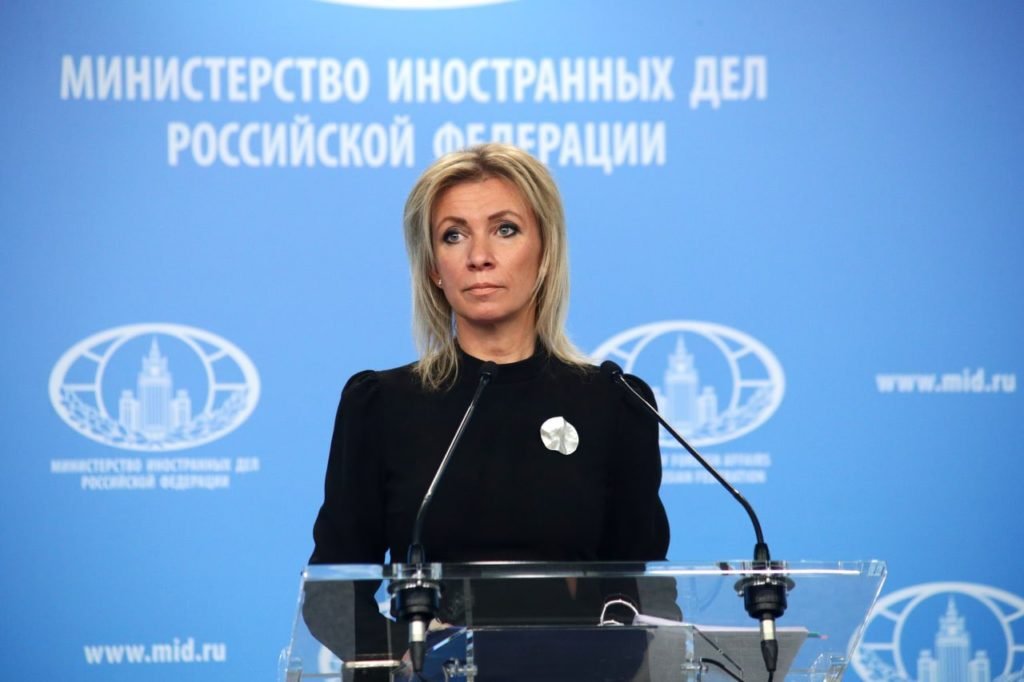Armenian Prime Minister Nikol Pashinyan will meet with Azerbaijani President Ilham Aliyev and Russian President Vladimir Putin in Sochi on October 31, Armenian authorities have confirmed.
Putin invited Pashinyan and Aliyev to “agree on a date” and “meet in Russia at any place, at any time” in a trilateral format, while addressing a summit of formerly Soviet states on October 14. Kremlin spokesperson Dmitry Peskov confirmed on Monday that a “summit is being prepared,” without providing further details about the time or place. Armenian parliamentary speaker Alen Simonyan told reporters on Wednesday that Pashinyan will visit Sochi on October 31 and that he assumes that Pashinyan will meet with Aliyev there.
Pashinyan confirmed while addressing the Armenian National Assembly on Wednesday that he will be going to Sochi, but said he has “no information” regarding whether or not the Azerbaijani leadership has confirmed its participation.

Pashinyan and Aliyev previously met with the Russian president nearly a year ago in November 2021. Since then, the South Caucasus leaders have had five in-person meetings, all of which were mediated by the European Union.
Russian authorities have criticized efforts by the EU and the United States to mediate negotiations between Armenia and Azerbaijan, accusing the West of attempting to wrest Russia’s role as the primary mediator in the South Caucasus. While western diplomacy in the South Caucasus has intensified, the Armenian government has criticized Russia for its failure to support Armenia militarily following Azerbaijan’s attacks in mid-September, as per mutual defense agreements, or to accuse Azerbaijan of violating Armenia’s sovereignty.
Pashinyan told parliament on Wednesday that the leaders will discuss the security of Artsakh in Sochi, as well as the demarcation of the Armenia-Azerbaijan border and the creation of security mechanisms along the border.
“It is incomprehensible for me that those colleagues who have said the creation of a delimitation committee is a security mechanism have not expressed a clear political position on the September 13 aggression,” Pashinyan said. “These are problems that I will discuss with the Russian president in a trilateral format.”
Russian Foreign Ministry spokesperson Maria Zakharova said that Armenia is subjected to “unprecedented external pressure” to “discredit Russia’s policy in the region,” in comments to the press on October 24.

“Numerous foundations, NGOs and the media, acting at the behest of Washington and Brussels, are striving with a vengeance to plant anti-Russian sentiments in society,” Zakharova said.
She called accusations that Moscow does not fulfill its security obligations to Armenia “unsubstantiated,” stating that the West is increasing its involvement in the South Caucasus out of self-interest.
“The true goals of Washington and Brussels are by no means the development of compromise and balanced solutions, but self-promotion and squeezing Russia out of the Transcaucasus,” Zakharova said.
US State Department spokesperson Ned Price responded that there is “no greater supporter than the United States for the sovereignty and independence of countries in the South Caucasus.”
“There is nothing self-promotional about seeking to put an end to years of conflict and to years of flare-ups that have led to violence and ultimately to deaths, both on the part of Armenians and the citizens of Azerbaijan. Our only goal here is to see and to help these countries work together to bring about a comprehensive and lasting peace, and ultimately to save lives,” Price said during a press briefing on October 25.
Regarding the upcoming meeting in Sochi, Price said that it is “ultimately for Armenia and Azerbaijan to decide whether President Putin’s invitation would be helpful or useful to them in pursuit of that lasting peace.”
“Russia’s 2008 invasion of Georgia and its ongoing brutal invasion of Ukraine suggests that Moscow has little respect for its neighbor’s sovereignty and is hardly a reliable, long-term partner,” Price said. “But ultimately, this is going to be a decision that Armenia and Azerbaijan will have to reach.”
Zakharova further accused the West of promoting “hastily concocted initiatives” that “do not take into account the interests of the entire population of the region.” She did not specify which portions of the population would be undermined by the negotiation process.
“Attempts by external forces to achieve the withdrawal of the Russian peacekeeping contingent are precisely aimed at destabilizing the South Caucasus,” Zakharova said.
Artsakh President Arayik Harutyunyan suggested that the security of Artsakh depends on Russia during a televised interview on October 21.
“I don’t imagine the future of Artsakh without the presence of the Russian Federation in the form of a peacekeeping contingent or another mission,” Harutyunyan said.
He also precluded any agreement that would recognize Azerbaijani control over Artsakh, implicitly suggesting that western peace proposals would be detrimental to Artsakh.
“We have to tell our public that international players that are trying to offer their services with regard to that formula or treaty are not quite making beneficial proposals,” Harutunyan said. “But this will not prevent us from using the important norm about peoples’ right to self-determination in accordance with the UN charter, and our struggle will be within the framework of that norm.”
On October 4, Haykakan Zhamanak, a Yerevan-based newspaper edited by Pashinyan’s wife Anna Hakobyan, published an article by an anonymous source arguing that Russia wants Armenia “as vulnerable as possible” to ensure its dependence on Russia.
“Russia wants from Armenia nearly what it wants from Ukraine—that it becomes part of the Russia-Belarus Union State or part of Russia itself,” the article reads.
The article, widely believed in Armenia to be penned by Pashinyan, argues that it is in Russia’s interest to prolong the Artsakh conflict as a “lever of influence over Armenia and Azerbaijan.”
Earlier this year, Azerbaijan submitted five principles to Armenia on which a peace agreement should be based, including the recognition of each other’s territorial integrity. Pashinyan has said that he is prepared to recognize Azerbaijan’s territorial integrity. He has also stated that an initial peace agreement should not include any references to the status or security of Artsakh. Opposition figures have accused Pashinyan of being prepared to recognize Artsakh as part of Azerbaijan.



С врагом, агрессором , захватчиком не ведут переговоры. Общеармянскими усилиями создать армию способную вернуть Арцах, смыть общенациональный позор…
via Google Translate: “They do not negotiate with the enemy, the aggressor, the invader. With all-Armenian efforts, create an army capable of returning Artsakh, wash away the national shame…”
Please. Include translation with comments. Not everyone reads Russian.
Thanks
This Russian foreign ministry spokesperson Zakharova is a joke. She reminds me of Trump’s White House press secretary Huckabee who was there not to present the truth but to cover and make excuses for all Trump’s failures and shortcomings and blame everything on the opposition. For the sake of discussion, even if we assume all that she says is true, why would Russia treat its only and loyal Armenian military ally in the Caucasus the way it did during the 2020 undeclared war unleashed on the Armenians jointly by NATO member terrorist Turkey and its Azerbaijani criminal collaborator? Imagine Armenia’s supposed military ally Russia, with military bases in Armenia, portraying Armenia’s enemy Azerbaijan’s aggression against sovereign Armenian territory as internal border conflict while calling ‘provocateurs’ those who accurately and decisively, without any vague language, calling it Azerbaijani aggression against Armenia.
She calls Russia’s lack of fulfillment of its security obligations to Armenia ‘unsubstantiated’ when Russia did not even lift a finger to help protect Armenia’s borders and airspace from Turkish NATO supplied F-16 reconnaissance flights followed by bombardments and that the West is increasing its involvement in the region out of ‘self-interest’ when it is Russia that, under Western sanctions, is pumping and selling its oil & gas to the very same West through our enemy Azerbaijan’s pipelines and energy delivery systems. Needless to say, Russia has a price to pay for such Azerbaijani service and of course at Armenia’s expense. Furthermore, why would Russia go to war against Ukraine and practically destroy it under the suspicion of Ukraine wanting to join the NATO Alliance while turning a blind eye on the military presence of NATO ally terrorist Turkey in its Armenian ally’s backward only 50 kilometers from the Armenian capital? Why this double-standard?
She claims the true goals of Washington and Brussels are by no means the development of compromise and balanced solutions but self-promotion and squeezing Russia out of the region when in the last decade, prior to the 2020 undeclared terroristic war, Armenia’s enemy Azerbaijan’s nearly 70% of weapons purchases were from none other than from Armenia’s good-old Russian ally. Who did the Russians think all these weapons were to be used against? Against Iran which would have leveled Azerbaijan to the ground or for firing them into the Caspian to catch fish?
No one claims the West is acting the way it does out of complete sympathy for the Armenians at all. But why even give the West the opportunity to get involved in region the way Russia claims it does and all due to Russia’s deceitful treatment of Armenia in the first place? Pathetic!
To answer your first question, Russia wanted to teach Pashinyan a lesson for drifting towards the west. So, in 2020 Russia did not lift a finger and allowed Azerbaijan to win back the 7 territories apart from karabakh and a sizeable chunk of karabakh itself. It only stopped the war when Armenia was capitulating and it’s army was at the point of getting obliterated.
To answer your next question, Russia is one of the largest arms supplier anyone paying top dollar would get weapons from them, so why does it surprise you in the least ?
Iran is at the precipice. Israel is pursuing its long-held Yinon Plan goal of breaking the Iranian state into small pieces, and Turkey is encouraging provocations in Iranian Azerbaijan.
I do not live in Iran, but this is the first time, via social media, that I have seen Bozkurtlar hand signs flashed in Iran, and even a protestor carrying a photo of Aliyev.
I love Turkish people and have no racism towards them. I am partially Turk myself. But I hate the neo-fascist ideology of Pan-Turkism with all of my bones. Being ignorant, backwards, and pseudo-scientific is only the least of its problems.
Iranian Turks had no stake in the Soviet Union, in the violence of the Soviet times, in the war, or in any armed conflict with Armenians for more than 100 years. No Iranian, even of Azerbaijani Turkish background, has any reason in my view to have hatred of Armenia.
Iranians of all backgrounds are just so busy REACTING to the Islamic Republic that there is no thought about what future ACTION should be. And with this kind of hysteria and groupthink, I’m worried that some serious mistakes will be made.
The KGB apparatchik Heydar Aliyev was a Soviet crook, and his family continues to loot Azerbaijan today. But yet in Iranian Azerbaijan, everyone hates the Mullahs and the racist Persian nationalism so much, that his dictator son actually looks appealing to many who have found new pride in the so-called “Turk Nation”.
Aliyev’s artificial nationalism, his cult of personality, and his unequal hold on power would have fallen apart long ago if not for his ability to persuade ordinary people that life in Azerbaijan revolves around regaining Qarabaq and avenging Khojaly.
Pan-Turkism, and Azerbaijani nationalism in particular, is an oppressive ideology used to unify otherwise ordinary people with nothing but violence and hatred, while the greedy bastards in Ankara or Baku expand their personal empires at the expense of working people and soldiers.
Long live Iran, Armenia, and a free Azerbaijan!